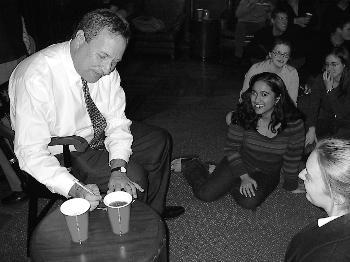
News
News Flash: Memory Shop and Anime Zakka to Open in Harvard Square

News
Harvard Researchers Develop AI-Driven Framework To Study Social Interactions, A Step Forward for Autism Research

News
Harvard Innovation Labs Announces 25 President’s Innovation Challenge Finalists

News
Graduate Student Council To Vote on Meeting Attendance Policy

News
Pop Hits and Politics: At Yardfest, Students Dance to Bedingfield and a Student Band Condemns Trump
Summers Addresses Grade Inflation

Grade inflation, especially Harvard’s high rate of honors degrees, could hurt Harvard students in the job market, University President Lawrence H. Summers said at a question-and-answer session with students Wednesday night.
Although he said Harvard is on par with other schools in awarding 50 percent A and A- grades, Summers said he is particularly concerned with honors inflation. The College awarded honors degrees to more than 90 percent of graduates last year.
“Honors inflation is a particularly serious concern because it calls into question the meaning of honors,” he said. “To some extent, [this is because] the quality of students has gotten better over time, but not completely.”
Summers, a former Harvard economics professor, said he worried that grade inflation would make employers think twice about Harvard students who graduated with honors diplomas.
“We’ve got to be sensitive not to put Harvard students at a disadvantage,” he said. “We’ve got to make sure a student who performs well is seen that way by employers.”
Talking with Winthrop House students last night as part of his plan to visit all of the Houses by the end of the year, Summers commented on a number of pressing student concerns during his first six months in office, including grade inflation and the Core Curriculum.
Although he said he did not “know the answers” to the problem of grade inflation, Summers suggested that the Faculty agree on guidelines for issuing grades because of the varying standards of different courses and departments.
“There are courses and fields where grades are more generous,” he said.
For example, he said, larger classes, which are typical of the Core, give lower grades on average.
Summers said the Core presents concerns about its lack of “flexibility” because students can count departmental courses for Core credit only in limited cases, even though the departmental classes are often more difficult.
“In some cases, Core courses on modes of thought crowd out [departmental] survey courses on the same material,” he said. “The Core has served Harvard well but does raise questions.”
Summers said that having specific courses or knowledge required for graduation is “an important issue” but that under the system the Core replaced, “there was a feeling those courses became sterile and people didn’t remember them anyways.”
One student asked about Summers’ view of his role as president in interacting with professors and departments, particularly in regard to the recent controversy over his October meeting with Fletcher University Professor Cornel R. West ’74.
Summers said that he recognized the importance of academic freedom and would not “tell a member of the faculty what his political beliefs should be” but he would actively encourage better teaching and research.
“There should be concerns expressed when greater contributions to scholarship or more effective teaching are possible,” he said. “The single most important responsibility that goes with leadership is pushing for excellence and service to the University.”
Summers also addressed recognition of students in the Reserve Officers Training Corps, the possible establishment of a Latino studies center and his upcoming decision on labor issues.
The president, who has fielded questions at Currier House and eaten with students in Adams House and Annenberg, plans to talk to students at Quincy and Leverett in the first week of February. At Winthrop last night, he was introduced by House Master Paul Hanson and welcomed by a five-member brass band.
—Staff writer Elisabeth S. Theodore can be reached at theodore@fas.harvard.edu.
Want to keep up with breaking news? Subscribe to our email newsletter.
Most Read
- Shots Fired on MBTA Train Near Harvard Square, Harvard Lifts Instruction To Shelter in Place
- No Suspects in Custody After Gunshots in Harvard Square, Cambridge Police Say
- White House Officials Say They Sent Harvard April 11 Demands in Error, New York Times Reports
- Trump To Cut Another $1 Billion From Harvard Health Research Funding, Wall Street Journal Reports
- Harvard School of Public Health Begins Layoffs As Trump Slashes Funding
From Our Advertisers

Over 300+ courses at prestigious colleges and universities in the US and UK are at your disposal.

Where you should have gotten your protein since 1998.

Serve as a proctor for Harvard Summer School (HSS) students, either in the Secondary School Program (SSP), General Program (GP), or Pre-College Program.

With an increasingly competitive Law School admissions process, it's important to understand what makes an applicant stand out.

Welcome to your one-stop gifting destination for men and women—it's like your neighborhood holiday shop, but way cooler.

HUSL seeks to create and empower a community of students who are seeking pathways into the Sports Business Industry.
